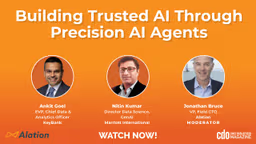Opinion & Analysis
Built on Trust — Why Every CDO Needs This 14-Pillar Framework for Scaling AI
Written by: CDO Magazine Bureau
Updated 3:00 PM UTC, Tue November 11, 2025

Everyone wants AI now. Boards want momentum, regulators want assurance, and business leaders want visible impact. Yet the truth is uncomfortable: AI success depends less on the brilliance of algorithms and far more on trust — and trust begins with data foundations.
Across industries, organizations are racing to deploy GenAI, autonomous decision engines, and predictive models while their underlying data fabric remains fragmented and poorly governed. AI can’t wait, but data isn’t ready. That’s the modern CDO’s paradox: Deliver innovation fast, yet build it on rock-solid foundations.
Quick proofs of concept satisfy curiosity but rarely scale because the data beneath them lacks structure, lineage, and quality. Without trusted data, models deliver impressive prototypes but unreliable results. The consequence isn’t just technical debt — it’s institutional mistrust. Every inconsistent output erodes confidence, turning early excitement into fatigue. Responsible CDOs know that progress without governance is not innovation; it’s entropy at speed.
Foundations before flight
Data foundations are the quiet infrastructure that makes AI defensible. In my framework — The 14 Foundational Pillars — governance precedes intelligence. They’re organized across three layers:
Data definition and context:
- Metadata registration: Know what data exists and where it lives.
- Tagging and classification: Apply business, risk, and policy context early.
- Data labeling (for AI/ML): Annotate datasets for learning readiness.
- Curation and standardization: Cleanse, deduplicate, and align to business meaning.
- Reference and master data harmonization: Ensure consistency across entities using APIs and ML reconciliation.
Data integrity and protection:
- Lineage and traceability: Map how data flows and transforms.
- Quality monitoring: Continuously test accuracy, timeliness, and completeness.
- Access and entitlement: Enforce secure, role-based use of validated data.
- Encryption enforcement: Protect sensitive data in motion, at rest, and in use.
Data accountability and control:
- Ownership and stewardship accountability: Embed LoD1 execution with LoD2 oversight.
- Governance frameworks: Operate under DMICF, RCSA, and DAA for defensibility.
- Playbooks and runbooks: Institutionalize data-quality and compliance processes.
- Scorecards: Track completeness, accuracy, and control coverage.
- Data risk and control assurance: Tie data risks to enterprise RCSA for measurable remediation.
Each pillar builds on the one before it, creating a trust lattice where AI learns from reality, not noise. Only after this multi-tier stack matures does AI become enterprise-grade — consistent, contextualized, and defensible.
The leadership balance — solve and scale
Perfection can’t be the precondition for progress. Waiting until every data pillar is flawless risks paralysis. CDOs must run a two-speed strategy that respects both readiness and urgency:
- Tier 1 — Foundationally dependent use cases: AI initiatives that demand complete accuracy and lineage — risk analytics, regulatory, and financial reporting — should wait until foundations stabilize.
- Tier 2 — Foundationally light use cases: Exploratory or narrow applications, such as chatbots, text summarization, or anomaly detection, can proceed while guardrails mature.
Each deployment becomes a diagnostic tool — AI surfaces cracks in data quality and governance, and those insights feed directly into the foundation backlog. This transforms AI from a consumer of data maturity into a driver of it.
Solve first, scale later. That single discipline enables visible progress without compromising integrity.
Guardrails and accountability
Responsible AI leadership isn’t about saying no; it’s about defining how far yes can go safely. CDOs must establish transparent guardrails:
- Low-risk use cases may move to production on current foundations.
- High-risk or regulated deployments remain gated until controls reach maturity.
This delivers progress with control — production, not recklessness — and reframes governance from gatekeeping to enabling responsible speed.
Embedding accountability within LoD1 operations and LoD2 oversight ensures that data quality and AI integrity are everyone’s responsibility, not a compliance side task.
Why trust is the true differentiator
Algorithms evolve weekly; trust does not. Enterprises that treat governance as a one-time checklist will forever chase stability. Those that embed accountability, transparency, and stewardship into daily execution build an enduring competitive moat.
The lesson from decades of systems architecture still holds: Elegant technology fails on weak foundations, but even legacy systems thrive on disciplined data structures and clear ownership. AI is no different — it’s not the model that defines success, but the integrity of what the model learns from.
A CDO’s closing reflection
Our job isn’t to slow innovation; it’s to make it sustainable. We cannot wait for every pillar to be perfect, but we also cannot allow AI enthusiasm to outpace data responsibility.
Trust is the bridge between the two. Build it deliberately. Strengthen it continuously. Because, in the end, AI isn’t built on algorithms — it’s built on trust — and that trust begins, always, with data foundations.
About the Author:
Deepak J. Shah is the Command Chief Data & Analytics Officer (CDAO) at the U.S. Army’s largest command, leading enterprise-wide data transformation for more than 750,000 personnel. With 29 years of experience across global investment banking and capital markets — including senior roles at Wells Fargo, SWIB, and Credit Suisse — he is recognized for architecting data-governance frameworks that unify metadata, lineage, quality, and control assurance to deliver measurable enterprise outcomes.
Shah’s 14-pillar CDO Foundational Stack is widely cited as a model for integrating governance, AI/ML enablement, and regulatory resilience. A Carnegie Mellon–certified CDO Executive Education alumnus, he frequently keynotes at national data and defense summits, championing responsible AI and trusted-data ecosystems that drive innovation with integrity.





